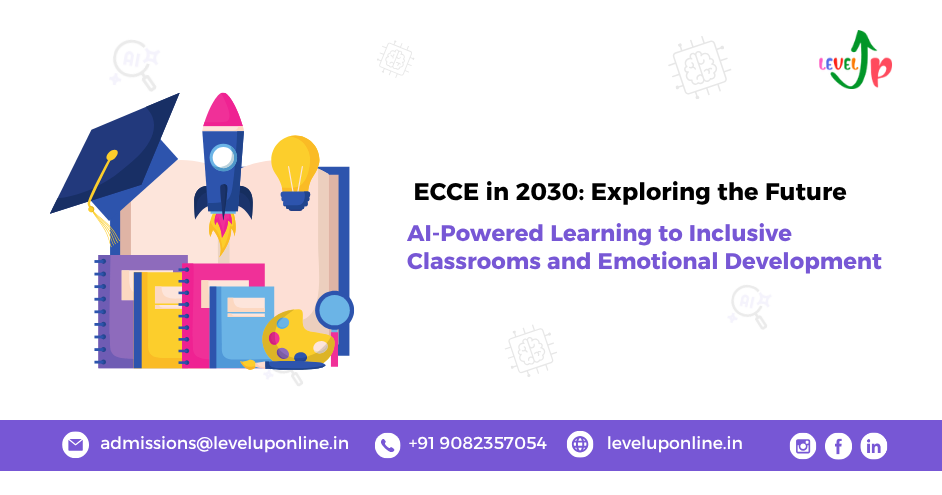Introduction to the Future of ECCE
Have you ever wondered what preschools might look like in the next 5–10 years? The future of ECCE (Early Childhood Care and Education) is unfolding faster than we think. With AI, personalization, and global digital movements, ECCE in 2030 will be unrecognizable from today’s playgroups and nurseries. And here’s the kicker — what we do today will shape how the future of ECCE unfolds.
So, let’s take a time machine ride and explore the changes, trends, and opportunities in the future of ECCE.
Technological Integration in ECCE
AI-Powered Learning Tools for Toddlers
Imagine a tiny tablet responding to your child’s mood and learning pace. That’s not sci-fi anymore. AI-based learning tools will become part of everyday ECCE classrooms. They can read facial expressions, adjust lesson difficulty, and provide real-time feedback.
Smart Classrooms and Virtual Reality
With AR and VR, toddlers could soon be “walking” through a virtual jungle or space station — learning through experience rather than just pictures. The future of ECCE will blur the line between play and learning with immersive technology.
Pros and Cons of Tech-Based ECCE
While tech can personalize and gamify learning, too much screen time is still a concern. Striking the right balance will be crucial.
Personalized Learning and Adaptive Curriculum
Data-Driven Early Education
By 2030, educators will use learning analytics to track progress in real time. Data will help adjust teaching methods instantly, ensuring no child is left behind.
Tailoring Curriculum to Each Child’s Needs
The future of ECCE means breaking away from one-size-fits-all models. Curriculums will adapt to children’s learning styles, emotional needs, and even interests — yes, even if dinosaurs are the only thing they care about that week.
Role of Teachers in the Future of ECCE
From Instructor to Facilitator
Teachers in 2030 will act more like guides than strict instructors. Their role will involve encouraging curiosity, supporting emotional development, and helping children navigate tech-rich environments.
Skills ECCE Educators Will Need in 2030
Digital literacy, emotional intelligence, cultural competence, and adaptability will be the top skills for ECCE educators of the future.
ECCE and Emotional Intelligence Development
Importance of SEL (Social Emotional Learning)
Tech can teach ABCs, but it can’t replace the importance of kindness, empathy, and self-regulation. SEL will be embedded into daily activities, stories, and peer interaction in the future of ECCE.
Mindfulness and Mental Health in Early Education
Activities like breathing exercises and nature walks will help little ones manage emotions early on, creating emotionally resilient individuals.
Inclusive and Accessible ECCE for All
Supporting Differently-Abled Children
ECCE in 2030 will lean heavily toward inclusion. Assistive tech, sensory-friendly classrooms, and trained educators will ensure equitable learning for every child.
Reaching Rural and Underprivileged Communities
With low-cost digital solutions and mobile ECCE centers, education will reach even the most remote corners of the world.
ECCE and Cultural Diversity
Multilingual and Multicultural Classrooms
The future of ECCE is global. Children will grow up learning not just multiple languages but understanding diverse cultures, fostering respect and global citizenship from an early age.
Respecting Identity in Early Years
From food and dress to festivals and storytelling, cultural identity will be celebrated, not sidelined.
ECCE and Parental Involvement in 2030
The Role of Digital Communication
Parents will be more connected than ever through apps and live video updates. They’ll receive personalized feedback and progress reports — all from their phones.
Home-Based Learning Support Systems
Future ECCE will include home kits, online workshops, and AI tools for parents to assist their child’s learning outside the classroom.
Environmental Education in ECCE
Teaching Sustainability from an Early Age
From growing plants to recycling games, environmental awareness will be integrated into the curriculum. After all, tomorrow’s planet lies in today’s tiny hands.
Government Policies and Global Investments
The Impact of UN SDGs on ECCE
Sustainable Development Goal 4.2 emphasizes access to quality ECCE by 2030. That means increased investments, better teacher training, and global collaborations.
Funding and Reforms
Expect more public-private partnerships, digital resource libraries, and reforms to ensure every child benefits from the future of ECCE.
Future Assessment Methods in ECCE
Beyond Marks—Growth Tracking
Traditional testing will give way to observational learning, portfolios, and progress dashboards, ensuring assessment is holistic and stress-free.
Challenges to the Future of ECCE
Digital Divide and Access Inequality
Not all children have access to devices or internet. Bridging this gap will be critical to ensure equity in ECCE’s future.
Balancing Tech with Human Touch
Over-reliance on screens can lead to developmental issues. Future ECCE must ensure tech complements — not replaces — human interaction.
Predictions and Vision for ECCE in 2030
What an Ideal Preschool May Look Like
Imagine a preschool with green walls, virtual learning pods, outdoor classrooms, therapy dogs, and inclusive playgrounds. That’s what the future of ECCE might offer.
Global Trends Shaping ECCE’s Future
From AI to climate awareness to emotional learning, ECCE in 2030 will be a beautiful blend of innovation, empathy, and imagination.
How Parents and Educators Can Prepare Today
- Embrace technology mindfully
- Encourage curiosity and empathy
- Stay updated with ECCE trends
- Advocate for inclusive and affordable education
- Build a supportive learning ecosystem at home
Conclusion
The future of ECCE is bright, bold, and beautifully complex. It’s a space where robots and rainbows will coexist, where every child’s uniqueness is celebrated, and where learning goes beyond books. As we walk toward 2030, it’s time we rethink, reshape, and reignite our passion for early childhood education — because how we educate our youngest citizens will shape the world they inherit.


